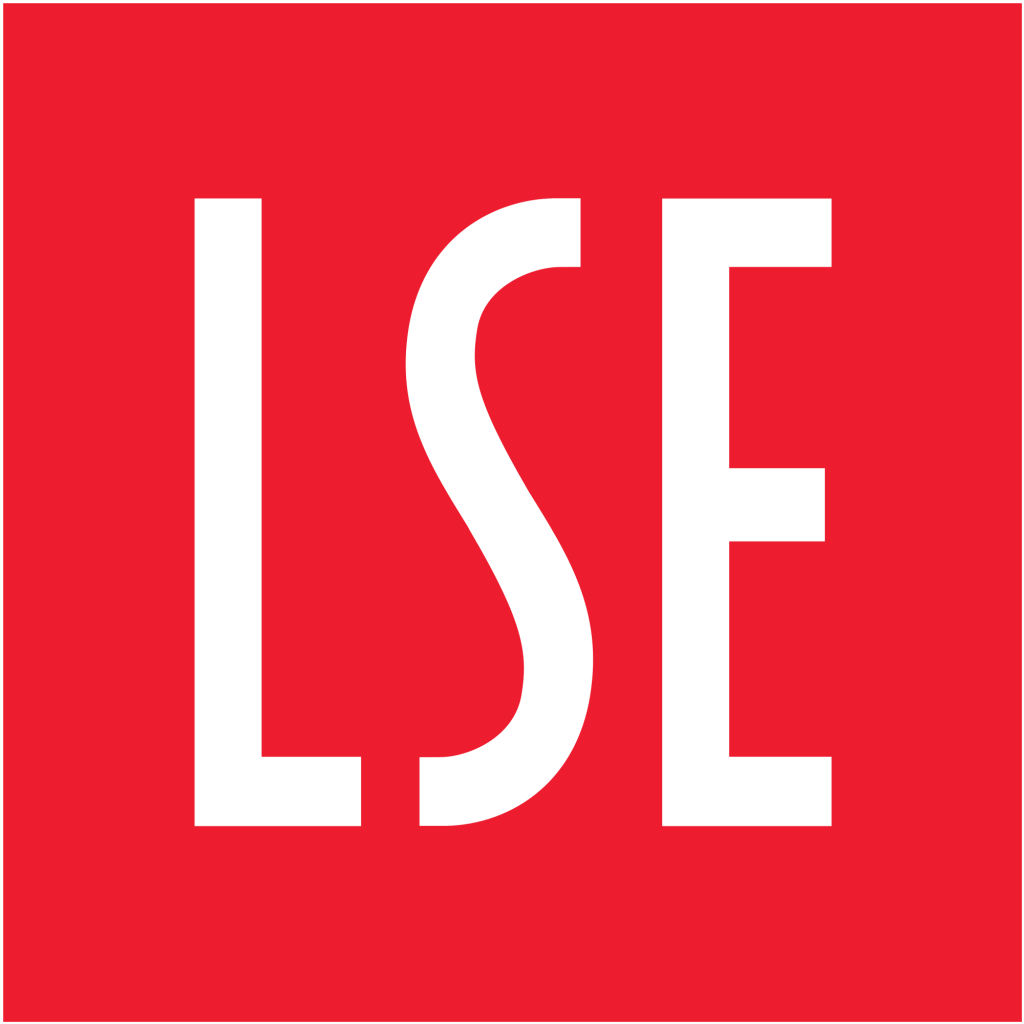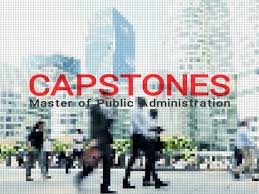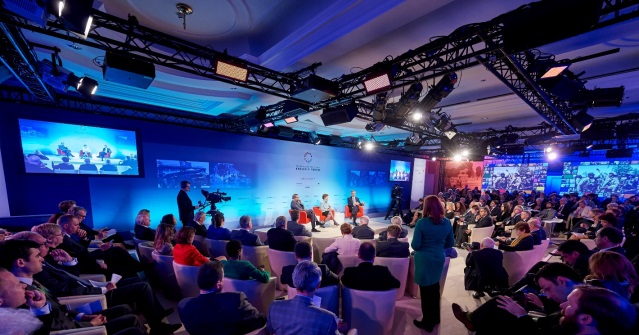
March 2016 was an eventful time to be in Brussels: within a handful of days, Salah Abdeslam was arrested in Molenbeek in connection with the November 2015 Paris attacks, the European Union agreed a package of migration measures with Turkey, and the Zaventem airport and Maalbeek metro station were bombed. It just so happened that I was visiting Brussels for the first time, and for the rather apropos (if more uplifting) purpose of attending the German Marshall Fund of the United States’ (GMF) flagship annual conference, The Brussels Forum.
The GMF is a leading transatlantic think tank and policy network which connects leaders from the political, corporate and academic spheres in both Europe and the U.S., with the aim of fostering greater international cooperation in the spirit of the original 1948 Marshall Plan.
I was invited to attend the Young Professionals Summit (YPS) programme within the broader conference, along with approximately 80 other under-33 participants hailing from organisations as diverse as the World Bank, Brookings Institution, U.S. State Department, European Parliament, European Investment Bank, Bruegel, NATO, Daimler, Deloitte, and many others. YPS delegates are selected on the criteria of:
- leadership potential
- interest in transatlantic policy issues
- intellectual curiosity
- commitment to global engagement
The 2016 theme for the Brussels Forum was “A World Beyond Disorder”, underlining the emergence of myriad policy issues that increasingly challenge the relevance of national borders such as the flows of data, refugees, terrorism or disease, and the struggle governments face in addressing these problems in a coordinated, expedient fashion.
This theme was explored from many perspectives across four days of panel discussions and breakout sessions by a large cast of prominent transatlantic thinkers, including policymakers such as Pascal Lamy (former Director-General of the World Trade Organization), journalist Steven Erlanger of The New York Times, corporate luminary Caroline Atkinson, Head of Global Policy at Google, and researchers such as Anne-Marie Slaughter of the New America Foundation.
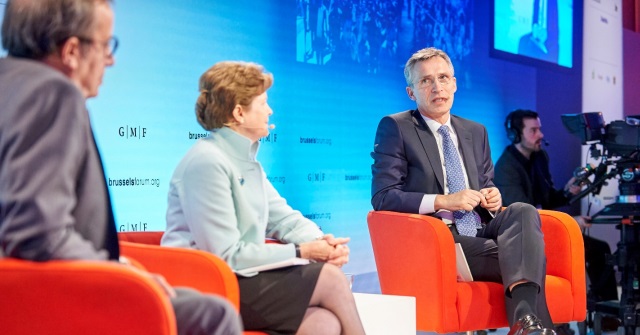
The sessions covered a broad range of policy areas that affect both sides of the Atlantic such as:
- security
- the rise of populist political parties
- the EU migration crisis
- international trade
- the role of technology in policy-making.
Although many observations and insights arose from these discussions, a few of the common threads included the importance of strategic thinking at government ministries that are currently often overwhelmed with near-term crisis management, the centrality of Africa as a top European priority for both economic growth opportunities and vigilance of terror threats, the meaningful policy role cities can play in the absence of action at the national level, and initiatives underway in the EU to unlock entrepreneurial innovation e.g. Capital Markets Union.
In addition to formal conversations, the weekend also offered off-the-record “Night Owl” sessions and themed breakout dinners. Here, attendees enjoyed greater latitude in posing controversial questions and expressing frank opinions on current events. I took part in a dinner called “Creating a Stable Financial System”, at which senior representatives of the think tank, hedge fund, consultancy and legal communities shared their thoughts on the latest developments concerning Banking Union, Brexit and the Basel III capital regime. I raised a topic of particular personal interest: Eurozone debt mutualisation – “Eurobonds” The group spent a few minutes discussing the various structures that have been proposed to erect a firewall between financial markets and vulnerable sovereigns, while also assuaging moral hazard concerns and incentivising fiscal discipline. Professor Paul De Grauwe, who leads the LSE’s Political Economy of European Monetary Integration course, has been a prominent contributor to this debate, so this session was a gratifying opportunity to connect my MPA studies with a real world policy topic in the company of leading subject matter experts.
I was nominated by my YPS peers (along with three others) to sit on a panel on “Engaging a New Generation of Transatlanticists to Think the Unthinkable”. We were asked to offer thoughts on how our generation of “future leaders” could more effectively address pressing global policy issues. I suggested that the U.S. in particular would be well-served by a more circumspect outlook vis-à-vis its place in the modern geopolitical order, citing American reaction to the recent founding of the Asian Infrastructure Investment Bank as an example of 20th century thinking in a world that has evolved dramatically since the founding of the Bretton Woods institutions.
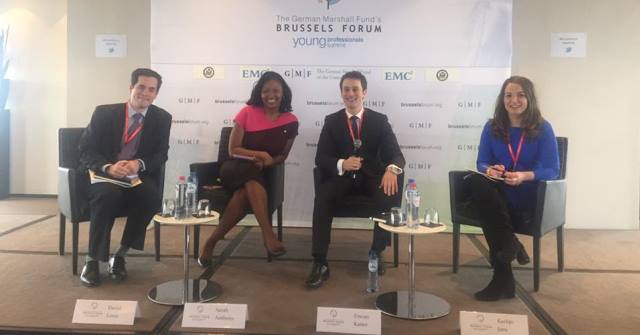
I found my time with GMF highly stimulating and engaging, and returned to London with new perspectives and ideas surrounding the transatlantic relationship. Against the backdrop of recent economic turmoil and security challenges, which have compelled both the U.S. and Europe to turn inward to some extent, this event has impressed upon me how crucial it is that governments on both sides of the Atlantic continue to articulate a constructive and informed message to their international allies (and adversaries).
The transatlantic community is still an indispensable partner in tackling global problems (“a necessary but no longer sufficient condition”, as one panelist put it), but must make greater strides in bringing the voices of emerging powers in Asia, Latin America and Africa into the conversation. Thanks to the support of the Institute of Public Affairs, I was fortunate enough to enjoy four days of intense immersion in European policy discussion in Brussels, and plan to integrate this experience into the remainder of my studies and my professional work beyond the LSE.
Photo sources:
https://www.flickr.com/photos/56747675@N07/sets/72157665903133112/with/25252452014/
https://www.flickr.com/photos/gmfus/sets/72157666073097836
David Lowe is a first year Master of Public Administration student. He is due to graduate in the Class of 2017.
